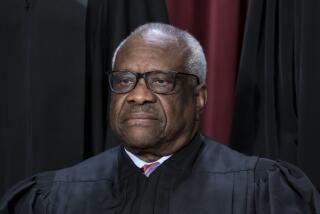Rehnquist’s Truthfulness Questioned : Law Professors Urge Senate to Resist Push for Rubber-Stamp OK
WASHINGTON — A group of law professors urged the Senate today to consider William H. Rehnquist’s truthfulness at his confirmation hearing and “resist the political push” to rubber-stamp his nomination as chief justice.
A leading authority on legal ethics also strongly reiterated a suggestion that Rehnquist acted improperly when he participated in a Supreme Court decision involving military spying against civilians because he had worked on the issue while at the Nixon Justice Department.
In letters to the lawmakers, some of the nation’s leading legal scholars said Rehnquist’s nomination has become a “testing ground for the ethical standards of this nation.”
Debate Urged
They urged an extensive debate on Rehnquist’s qualifications to be chief justice before voting on whether to confirm his nomination by President Reagan.
The Senate Judiciary Committee approved the nomination last month on a 13-5 vote. The full Senate is expected to take up Rehnquist’s nomination Thursday, followed by action on the parallel nomination of Antonin Scalia, now a federal appeals judge, to be an associate justice of the high court.
“There is a common and disturbing thread that runs through all of the matters that have been raised at (Rehnquist’s) hearings,” 75 law professors wrote. “That common thread pertains to the integrity and ethical standards of the nominee.”
Responses Challenged
The group raised questions about Rehnquist’s responses to charges that he harassed minority voters in Arizona, his ownership of two homes with deeds prohibiting their sale to Jews or blacks, and charges by his brother-in-law that he violated legal ethics in handling a family trust fund.
In each of these cases, the professors said Rehnquist’s “integrity, honesty and character” are an issue. These are not “political attacks nor are they trivial,” they said.
But the group said the most serious charge involved Rehnquist’s refusal to disqualify himself from participating in the Supreme Court’s 1972 decision involving military spying against civilians.
Ethics Questioned
Geoffrey Hazard, a Yale Law School professor and leading authority on legal ethics, told the Senate in a separate letter that Rehnquist had had a duty to remove himself from the case.
He raised questions about Rehnquist’s candor in telling the Judiciary Committee that he had “no recollection of any participation in the formulation of policy on the use of the military to conduct surveillance.” He suggested Rehnquist acted improperly in not removing himself from the case.
More to Read
Get the L.A. Times Politics newsletter
Deeply reported insights into legislation, politics and policy from Sacramento, Washington and beyond. In your inbox three times per week.
You may occasionally receive promotional content from the Los Angeles Times.










